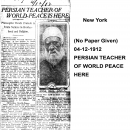Main menu
- ‘Abdu’l-Bahá’s Journey
- World Peace
- Stopping Racism in America
- Empowerment of Women
- More Principles...
- Prayer for America
Persian Teacher of World Peace is Here
Philosopher Heads Crusade to Unite Nations in Brotherhood and Religion.
“Khosohamadid.”
This is Persian, meaning “Howdy” or “Welcome.” It was spoken by ‘Abdu’l-Bahá Abbas, Persian philosopher, teacher and leader of the Bahá’í movement, as he sat in his apartment in the Hotel Ansonia, after his arrival here yesterday on the White Star liner Cedric.
‘Abdu’l-Bahá Abbas is accompanied by his nephew, Dr. Ameer Dareed, and two other philosophers, Said Assadullah and Effendi Shoghi.
‘Abdul spent most of his time at sea standing by the side of the wireless operator. He saluted the Statue of Liberty by extending his arms. “There is the New World’s symbol of liberty and freedom,” he exclaimed.
A steerage passenger of the Cedric developed smallpox after the ship left Gibraltar, and 200 third class passengers were transferred to the Detention Hospital in the lower bay. Among them was the Persian cook of ‘Abdul. He will be held until his bill of health is perfect.
‘Abdu’l-Bahá Abbas is sixty-eight, but from his appearance you would judge him to be at least in the nineties. He has a snowy white beard and white hair which is twisted in a kind of queue at the back of his head, below his “ammamah” or turbanlike skull-cap. This appearance of extreme age is due to the fact that forty years of his life were spent in the loathsome prison at Akka, Syria, over which it was commonly stated that no bird could fly without falling to the ground. His voice is strong.
Advocates World-Peace.
‘Abdu’l-Bahá Abbas does not speak English and carried on his conversation with newspaper men through his interpreter and personal physician, Dr. Ameen Fareed. He said:
“I have two reasons in coming to this country. The first is to travel and see your places of interest, your large cities and your country as any ordinary tourist might do. I do not come to make converts to the Bahá’í movement. I will remain about a week in New York and then go to Washington. I want to meet your prominent people. I have heard of the numerous organizations in this country toward the establishment of universal peace and the popular interest manifested in this peace movement.” I am advocate of international peace and human solidarity, because it is one of the fundamental tenets of the Bahá’í faith and all nations and all religions may become united and by that unity, perfect peace may reign among them all.
“All strife and animosity existing among the religions of the world is solely due to misunderstandings. If these misunderstandings are once removed, then unity can be accomplished. This quarrelling, which has existed for 6,000 years, will vanish and we will all become one family, as originally we were all one family.”
The Persian philosopher said, there might be about 2,000,000 persons of all religions who have accepted the Bahá’í teachings.
Favors Woman Suffrage.
He pronounced himself very emphatically in favor of woman’s suffrage and said that the custom of wearing the veil in the East had been the very means of keeping women back. Monogamy was by all means the rule of his faith, and he said that divorce was permissible under certain conditions, if the man and woman were “hopelessly incompatible.”
‘Abdu’l-Bahá Abbas is not a prophet, but, as he expressed it, the “servant of the Glory of God,” his father, was founded the religion, having been the “Glory of God.” He said he didn’t want to be called a prophet.
The Persian philosopher was given a reception yesterday afternoon at the home of Edward Kinney, No. 780 West End avenue, where he gave a short talk to about one hundred and fifty persons from many parts of the country.
The Bahá’í movement began about seventy years ago with the rise of a teacher known as the “Báb,” who proclaimed the coming of a still greater teacher whose mission would be the establishment of universal religion, the brotherhood of man and universal peace. The “Báb” was followed by the father of the man who is now visiting us, whose teachings were so reprehensible to the Turkish Government that he was thrown into prison, where he died in 1892, leaving his son to carry on the work.
‘Abdu’l-Bahá Abbas will remain, in America four months and then go to Japan and China.
[picture caption: ‘ABDU’L-BAHA ABBAS]









